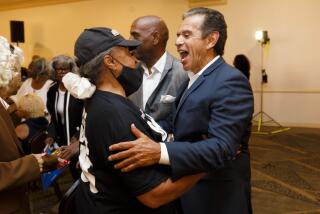Villagra to succeed Ripston as head of ACLU of Southern California
Civil rights attorney Hector Villagra will succeed Ramona Ripston as executive director of the American Civil Liberties Union of Southern California, the organization announced Monday.
Villagra, the group’s legal director, identified an increasingly anti-immigrant environment as the ACLU’s biggest challenge in the defense of individual rights.
He also said he expected to make a priority of extending the group’s advocacy to the underserved and the vulnerable, including African Americans, Latinos, Muslims and the gay, lesbian, bisexual and transgender communities.
Villagra, former lead counsel for the Mexican American Legal Defense and Education Fund, said the spread of anti-immigrant sentiment is “here to stay for the short term.”
“What we will continue to see over the next few years is attempts by localities — cities and counties — to get increasingly involved in enforcement of federal immigration law,” Villagra said, citing Arizona’s law subjecting individuals to police searches on the mere suspicion of being undocumented. “Those attempts by and large are illegal.”
Villagra, 42, will succeed Ripston in February, when she steps down after nearly four decades of battling authorities over the rights of prisoners, minorities and the needy.
“I understand full well the size of the shoes I’m being asked to fill,” Villagra said in an interview after his appointment was announced. “Ramona is really an icon in the Southern California civil rights community and beyond. I know I have a tough job ahead of me, but we have a strong organization and strong support, and I fully expect that our success will continue.”
Ripston, 83, said in February that she wanted to clear the way for a “rejuvenation” of liberal activism in Los Angeles. She will remain active in fundraising and efforts to help the homeless, she said.
She praised the selection of Villagra, saying he “combines agile and incisive legal thinking with deep compassion, tenaciousness and an unswerving dedication to the causes of civil liberties and civil rights.”
More to Read
Sign up for Essential California
The most important California stories and recommendations in your inbox every morning.
You may occasionally receive promotional content from the Los Angeles Times.










